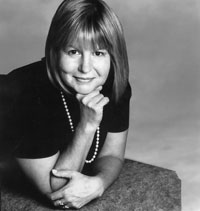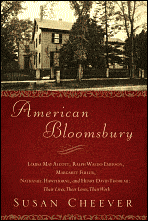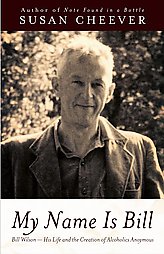
| NYWI HOME PAGE | VISITING WRITERS & EVENTS INDEX | VIDEO ARCHIVES |
 |
Fiction and Nonfiction Writer
NYS Writers Institute, February 1, 2007
4:15 pm Seminar | Assembly Hall, Campus Center
8:00 p.m. Reading | Recital Hall, Performing Arts Center
PROFILE
Susan Cheever, novelist, nonfiction writer, and "Newsday" columnist, is the bestselling author of four extraordinary memoirs, including "Note Found in a Bottle: My Life as a Drinker" (1999), about her near-fatal battle with alcoholism; and "Home Before Dark" (1984), a loving, but unsparing portrait of her father, John Cheever, the brilliant, troubled writer known for his novels of American suburbia. "Home Before Dark" received the "Boston Globe's" Winship Book Award and was a National Book Critics Circle Award finalist.
| � |
Susan Cheever's new book is the "group biography," "American Bloomsbury" (2006), a study of the intertwined lives and love affairs of Louisa May Alcott, Ralph Waldo Emerson, Margaret Fuller, Nathaniel Hawthorne, and Henry David Thoreau. "Library Journal" has called it, "Essential reading for anyone with an interest in American letters." Cheever herself has characterized the book as the "Desperate Housewives" of the 1800s.
In writing "American Bloomsbury," Cheever hoped to emphasize something that is missing from famous histories of the Transcendentalist literary world of Concord, Massachusetts: the role of women as authors, intellectual collaborators, friends, confidants, wives, and lovers. In addition to Alcott and Fuller, Cheever examines the lives and contributions of Sophia  Peabody, who married Nathaniel Hawthorne after he jilted her sister, Elizabeth; as well as Ellen Tucker Emerson and Lidian Emerson, the first and second wives of Ralph Waldo Emerson. Cheever told an interviewer for "Publishers Weekly" that adding these women "into the mix made it a completely different set of stories."
Peabody, who married Nathaniel Hawthorne after he jilted her sister, Elizabeth; as well as Ellen Tucker Emerson and Lidian Emerson, the first and second wives of Ralph Waldo Emerson. Cheever told an interviewer for "Publishers Weekly" that adding these women "into the mix made it a completely different set of stories."
Susan Cheever is also the author of "My Name is Bill" (2004), the story of Bill Wilson, founder of Alcoholics Anonymous.
"As a biography of one of the most humane and beneficial Americans who ever lived, it is a national treasure." - Kurt Vonnegut
 Cheever's other nonfiction books include "As Good as I Could Be: A Memoir about Raising Wonderful Children in Difficult Times" (2001), "A Woman's Life: The Story of an Ordinary American and Her Extraordinary Generation" (1994), and "Treetops: A Family Memoir" (1991). Her novels include "Elizabeth Cole" (1989), "Doctors and Women" (1987), "The Cage" (1982), "A Handsome Man" (1981), and "Looking for Work" (1980).
Cheever's other nonfiction books include "As Good as I Could Be: A Memoir about Raising Wonderful Children in Difficult Times" (2001), "A Woman's Life: The Story of an Ordinary American and Her Extraordinary Generation" (1994), and "Treetops: A Family Memoir" (1991). Her novels include "Elizabeth Cole" (1989), "Doctors and Women" (1987), "The Cage" (1982), "A Handsome Man" (1981), and "Looking for Work" (1980).
She also authored a regular column for "Newsday" on parenting, politics and other subjects from 1992 to 2006. During the 1970s, she served as religion editor and lifestyles editor for "Newsweek."
Among its many revelations, the book provides evidence that "The Scarlet Letter's" Hester Prynne was based on Margaret Fuller, Hawthorne's intimate friend, and that "Little Women's" Laurie was based on Thoreau, with whom Alcott was passionately in love.
Additional Links:
Sunday Gazette Article
Times Union Article
For additional information, contact the Writers Institute at 518-442-5620 or online at https://www.albany.edu/writers-inst.